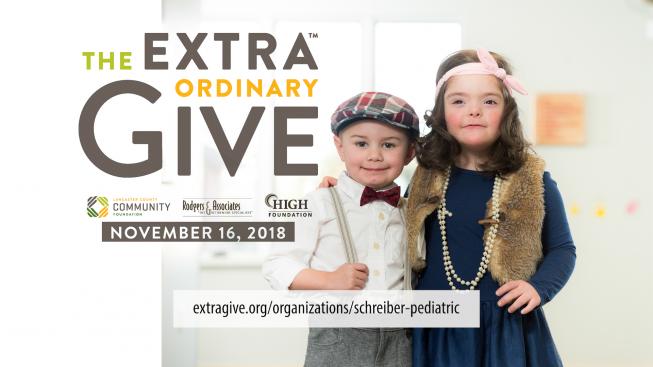Year: 2018
Changes bring start of new era
October 25, 2018Some of you probably already know that what we call Schreiber today has been around since 1936. In those 82 years, we have gone by several different names: The Society for Crippled Children and Adults, the National Easter Seals Society and, starting in 1994, Schreiber Pediatric Rehab Center of Lancaster County.
Now, we are excited to tell you about our new name and introduce our new logo.

In the nearly 25 years since we adopted our most recent name, Schreiber has experienced many changes and a lot of growth. We see more children than ever. We see kids with a wider array of diagnoses. We did a major expansion in 2006, and we have added new services, including aquatic therapy, thanks to our new pool, and the Circle of Friends Academy daycare center, which now accepts children as young as 6 weeks.
The staff and the board leadership of the center began to think that our name didn’t reflect the breadth of services we provide. While we still see many kids that you might expect to see at Schreiber, kids born with cerebral palsy or spina bifida, we also see lots of other kids whose challenges aren’t nearly as complex. They might have a minor speech delay or need a little help with their fine motor skills.
We also have a fair number of typically developing kids. They attend our S.T.A.R.S. Preschool or Circle of Friends. Or they come for swim lessons. Or they attend with their parents to learn baby signing or infant massage or kids’ yoga.
As our new mission statement reads: “We provide everything needed for all of life’s challenges, so that families and children can reach their dreams and vision. We see every child’s unique capabilities and help them achieve their fullest potential.”
The new mission statement guided the conversations about finding a new name. After numerous meetings during the strategic planning process of 2017, a stakeholder survey and a final review by the board, we will now be officially known as the Schreiber Center for Pediatric Development.
We didn’t want our brand to send the message that we are fixing “broken” kids. We are helping any family seeking services so that their son or daughter can be their best selves.
And we felt it was important to emphasize our new name with a new logo, one that keeps the name Schreiber at the center of our identity.
So take in our new name: The Schreiber Center for Pediatric Development. Check out our new logo. And know that we will keep doing what we’ve tried to do for 82 years: Enriching lives. Giving hope. For all who need us, every day.
Support Schreiber for the Extra Give
We have a new name and a new logo, but we still rely on the generosity of the community to operate.
Please consider a gift to Schreiber during the Extraordinary Give on Nov. 16. Go to www.extragive.org anytime on Nov. 16, find Schreiber’s listing and donate. It’s that easy. And every dollar supports the children of Schreiber.
Collaboration is central to Schreiber’s mission
September 25, 2018At Schreiber, we love to partner with other community organizations where missions overlap. We have exciting news about two new collaborations to talk about.

The first is about art. Lancaster Artwalk presents its next Artwalk Weekend Oct. 5-7, and there are at least 36 different locations participating.
The vast majority are in downtown Lancaster’s many art galleries and shops, but Artwalk has moved into the suburbs this year by adding a stop at Homestead Village’s Bachman Center, right next to us here at Schreiber.
The Bachman Center will be open for Artsfest 10 a.m. to 5 p.m. Saturday, Oct. 6, and noon to 4 p.m. Sunday, Oct. 7.
The best news: We will submit some 90 pieces of art, all made by Schreiber kiddos, for display at Homestead throughout the weekend.
Art from our preschoolers and day care kids and by clients will be next to works by 11 Lancaster County artisans, including Barry Smith, Doug Good, Barbara Ulmer and Kitty Filling.
Jay Graver, Schreiber’s director of educational services, has been coordinating the gathering of art from Schreiber kids. There’s a chance you could see a piece by Malcolm Corley, a Schreiber kiddo and emerging young artist we wrote about recently.
The schedule at Homestead will also feature pottery and glass-blowing demonstrations (Saturday) and screen-printing by the Thaddeus Stevens STEM Truck (Sunday).
Donations made during the event will benefit the Homestead Village endowment fund. Schreiber is happy to support’s Homestead as they have supported us, through sending volunteers for our Intergenerational Program, their annual Mother’s Day Jewelry Sale and contributing to our special events, like our Gala and the Rubber Duckie Race.

The other collaboration taps more directly into our expertise in providing therapy services for children. In this case, these would be services for some of the most vulnerable children.
The Lancaster County Behavioral Health and Developmental Services is launching a pilot program to serve families that have babies born with Neonatal Abstinence Syndrome. The program could be expanded later to serve families that have other conditions present at birth, including Down Syndrome.
Neonatal Abstinence Syndrome, or NAS, happens when a baby is exposed to drugs in the womb and suffers withdrawl after birth. The condition can cause many serious problems, including low birthweight, breathing and feeding problems and seizures.
The county selected three Early Intervention special instructors to start the program, and one of them is Schreiber’s Catherine Donohue, an early intervention teacher who specailizes in working with kids ages birth to age 3 that have developmental delays.
“They were looking for people who wanted to do this, and I wanted to do this,” said Catherine, who has worked at Schreiber for 13 years. “I’ve always been interested in that hospital connection.”
That hospital connection will make this program different than the work she typically does. Most of the time, Catherine sees kids at home, at day care or here at the Center. For this new BHDS program, the babies will still be in the neonatal intensive care unit, and she will be working with families in their homes.
The teachers will show families “how can they prepare themselves and their home to bring a special needs child home,” Catherine said.
The program calls for teachers to work with biological families and foster families.
“That’s one of the things they were looking for in the teachers, and I’ve done that,” she said.
A grateful Schreiber says thank you to the community
September 21, 2018In July, when we kicked off another season of selling tickets for this year’s 30th Annual Rubber Duckie Race & Festival, we did so with some anxiety.
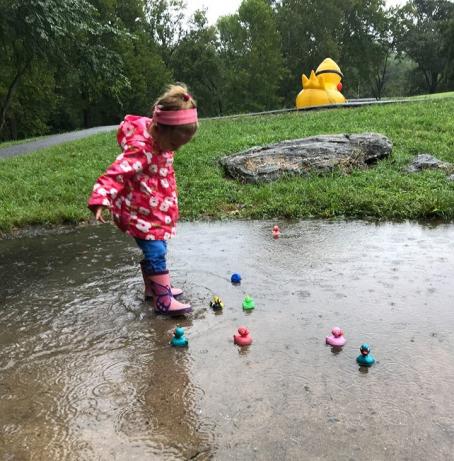
The event, our largest community fundraiser, had suffered a significant blow as the result of the loss of one of the key supporters of the race over the years.
Fundraising is critical to our operation. The loss of support could potentially have hurt our ability to provide services.
So we asked for your help. And as you always have done for Schreiber, throughout the 82 years we’ve been in Lancaster County, you came through. Thanks to you, we were able to reach our budget goal for Duckie: We netted more than $115,000.
We are grateful for the many volunteers who came into our office and said, “I’ll sell some Duckies for you.”
We are grateful for the many sponsors who stepped up with their support. And we would particularly like to thank Donegal Insurance Group for being our presenting sponsor.
Most of all, we are grateful for you, the thousands of people who bought tickets. You stopped by our table at Root’s or on Lancaster’s square outside of Central Market. You picked up some tickets from the persistent friend or relative who was selling. Or you came into the Center to buy, sometimes with a story about the child you know that we helped or the time you bought your first Duckie in 1998.
Some of you even came out to Duckie Day on Sept. 9, when it rained all day and our Festival amounted to a couple of picnic tables and some games under one of the pavilions.
Because of that, we asked — again — for help, this time to make up for the lost revenue caused by the weather. We normally raise $10,000 the day of the race through the sale of tickets, T-shirts and games. You have donated that much and more through after-the-event gifts.
Much of it came from Orrstown Bank, which had already provided a sponsorship, sold tickets at their branches and showed up on the rainy Duckie Day to do whatever we asked. The bank delivered this week an additional $15,000 donation.
We are grateful for all of it, but we’re already moving on to the next thing. The Extraordinary Give is coming up Nov. 16, and we will have some big news — some really big news — to tell you about as we get closer to that.
Until then, thank you, Lancaster County. With your support of Schreiber, you continue to improve the lives of all the children who need our services, every day.
A Schreiber kiddo grows into a young artist
September 14, 2018Maria Corley recognized pretty early on that her son Malcolm was different.
His paternal grandmother was a child psychologist, so she had experience with what typical childhood development looked like, Maria said.
“She noticed that he lined things up for me,” Maria said. “She saw the speech delays. The eye contact thing.”

An evaluation led to a diagnosis: PDD-NOS, or Pervasive Developmental Disorder-Not Otherwise Specified.
He was on the autism spectrum.
Malcolm was not quite 4 years old.
He started with Schreiber around the same time, first via home visits through Early Intervention then through appointments at the Center for therapy.
Emily Beddow was his occupational therapist almost from the beginning.
“He was 3, maybe 4, when I started seeing him,” Emily said. “We didn’t know if he’d even be able to write, (because of) the way he held his pencil. He’s really come a long way.”
He’s 19 now, tall and thin, like his mother. And he has artistic talents that started when he was young and have stayed with him into his young adulthood. When he was about 3, he started drawing images from the television show “Blues Clues.”
“Then he started doing Dr. Seuss pictures,” Maria said, “copying from ‘ABC’ and ‘Horton Hears a Who.’ When he started school, he had art class. You could see some talent there.”
Through school, his artistic talent continued to develop. He has had two solo art shows, the first through Millersville University’s Office of Visual and Performing Arts. That led to the second, at the Emerald Foundation’s Emerging Artist series.
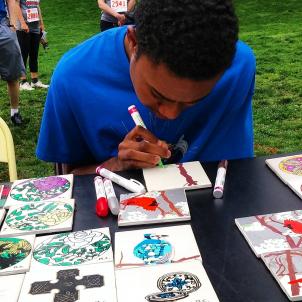
At the same time, he has quietly launched a small business, Malcom’s Tiles, creating hand-decorated tiles that has helped him earn some money. He sold the tiles at the Lancaster-Lebanon Intermediate Unit 13 and at the National Autism Conference and raised enough money to pay for a trip he really wanted to take: to see the Dutch amusement park Juliana Toren.
“He found the park on YouTube, and he really wanted to go,” Maria said. “He wanted to go so he could hug the two mouse mascots.”
The importance of the experience wasn’t lost on Maria.
“I’m trying to impress on him the fact that making money is helpful,” she said. “If he has some sort of a job where he can also do art, that would be good.”
These are the things you think about when you have a child on the autism spectrum who is about to enter the adult world.
He was discharged from therapy a few years ago, but he still is part of the Schreiber family. He still attends Club 625 outings.
“It’s an important social outlet for him,” Maria said. “That’s something he really looks forward to, socializing with his peer group.”
And Emily and Lisa Christoffel, his speech-language pathologist, both keep in touch. They attended his art shows to show support.
“Some kids and some families leave more of an impression on you,” Lisa said. “I saw Malcolm for more than 10 years. He’s a special kid, and his mom has done such a great job with him.”
That feeling is definitely mutual.
“The caring I’ve felt from the people who have worked with him has been remarkable,” Maria said. “I could see the therapists were really invested in him as a person. When I brought him here, I didn’t even know what his voice sounded like, he was that non-verbal.
“From almost having no language at all, he has learned phrases that allow him to communicate and build relationships. He’s come a long way, definitely.”
The journey isn’t over by any stretch. Maria has the questions all parents have about their kids as they grow up: What will happen to him? How will he take care of himself? Will he have friends? It’s all just a so… unknowable with Malcolm.
“I’m not really sure what he thinks about friends and adult relationships,” Maria said. “Making friends is difficult. He’s interested in girls. He seems happy. But maybe he’s lonely and I just don’t know.
“We’ve talked about the fact that I’m not always going to be here, so he needs to learn to do things for himself.”
Maria will keep working with him on that, teaching him how to advocate for himself, helping him grow his art business. And like any other parent, she will hope for the best.
Maria Corley is a performing pianist and organist who plays concerts at venues around central Pennsylvania. She is also half of Duo Chiaroscuro with cellist Sara Male, frequently offering Silence Optional concerts for people on the autism spectrum. She has two children, Malcolm, 19, and a daughter, Kiana, 21. She lives in East Hempfield Township.
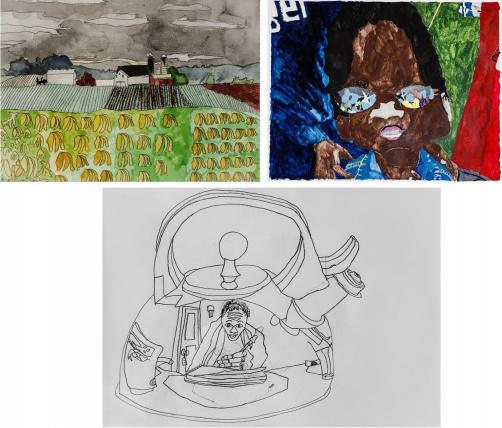
Schreiber campers ease into the end of summer
August 8, 2018The teens from the Club 625 Camp gathered this week for one of their last outings of the summer, a visit to Sky Zone. Before they did that, they had an important job to take care of.
Every year, the campers do some kind of community service project. This year, as in the past few years, they collected non-perishable food items to help stock the food pantry at Grace Lutheran Church in Lancaster.
Every Wednesday, Grace Lutheran servces about 150 dinners to those in need of a free home-cooked meal. The Schreiber kids and their parents brought in numerous bags of pasta, spaghetti sauce, canned bake beans, salad dressings and more.
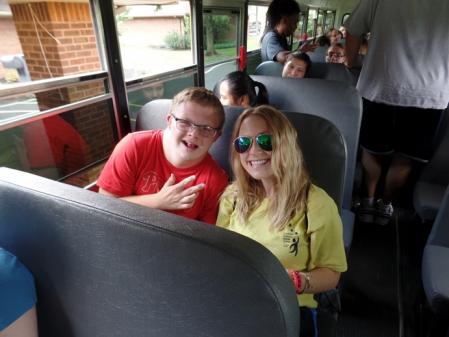 The kids have a week of fun activities and they help out some neighbors that are less fortunate. Nice work by Jay Graver and Carla Yando, who organize the camp, and by all the families who participated this year.
The kids have a week of fun activities and they help out some neighbors that are less fortunate. Nice work by Jay Graver and Carla Yando, who organize the camp, and by all the families who participated this year.
Speaking of Jay and Carla: After all of our camps end this month, they will be getting ready to welcome another group of S.T.A.R.S. preschoolers back to the classroom. And, once again, we would like to invite any Schreiber supporter who is also a customer of Giant Food Stores to participate in Giant’s A+ School Rewards Program. The program lets you earn cash for the schools you designate just by using your Giant BonusCard. If you have supported Schreiber in the past, you don’t need to re-register your card.
If you’re a new supporter or you want to make a change to your account:
Go to www.giantfoodstores.com.
Sign in to log into your Giant account, or register a new account.
Once you signed in, click on Manage My Account.
Click on the Rewards & Savings tab.
Click on the Change Schools button in the A+ School Rewards area, then select Schreiber S.T.A.R.S. from the list of schools.
Earn points and money for Schreiber from when the program runs, from Sept. 7 through March 16.
Register your card for Schreiber today!
Meet the Grassos, a second generation Schreiber family
July 11, 2018Starting services at Schreiber for two of her children did not create anxiety for Andrea Grasso. She had seen what Schreiber did for two of her sisters.
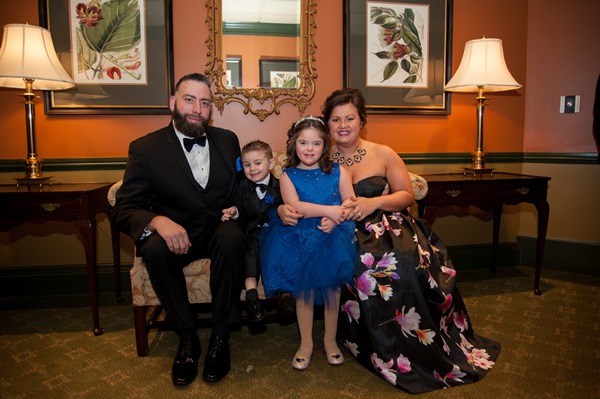
Andrea’s sister Ashley was born with Prader-Willi Syndrome, a rare genetic condition that creates a host of physical and developmental challenges.
“We came to Schreiber almost every day of the week for her preschool and her therapy services,” Andrea said. “It was just something I grew up with. (Schreiber is) something that’s been part of my family since she was born.”
Then her parents adopted Ariel, a little girl who had Down Syndrome. And the visits to Schreiber continued.
Fast forward a few years. Andrea met and married Nick Grasso. Nick was an only child, but that didn’t make it harder to blend in with his new family. It might have made it easier.
“Both of my sisters just love Nick,” Andrea said. “They just gravitated toward him, and he would embrace them with open arms.”
When it was time for Andrea and Nick to start a family, they were both open to children with special needs. For Andrea, it was a natural continuation of the relationships she built with her sisters as a child. For Nick, he saw they had the experiences and the resources that few adopting parents could offer.
So they adopted Mia and Giuliana, and Giuliana has Do
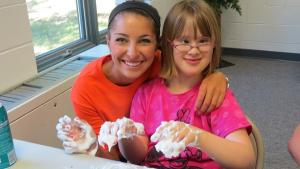
wn Syndrome, just like Andrea’s sister Ariel. And they have two biological sons, Paxton and Jude.
Of the four, it was Paxton’s start in life that proved to be the scariest. They had taken him home from the hospital, but at 10 days something appeared to be wrong. He was crying and fussy and not wanting to eat. At the pediatrician’s office, the doctor saw Paxton have a seizure and sent them right to Lancaster General Hospital.
The medical team there came back with the kind of news that would be any new parent’s worst nightmare.
“The doctor came in and said, ‘He has a Level 3 brain hemorrhage. We need to get him to Hershey. LifeLine will be here in 7 minutes. And you need to get to Hershey as soon as you can.'”
Andrea remembers little of what happened on the trip to Penn State’s Milton S. Hershey Medical Center.
“I know it was a whirlwind of doctors. And I remember pleading, ‘Can I please go with him? Can I please go with him?’ And they said no. And from that point on it was just a blur. We got to Hershey, and he had already been there for 15 or 20 minutes. They had him settled in a room. And he had tubes, and he was just very sick. It was terrifying. As a new mom, you have two young children at home already, and then you have this new baby, and he’s sick and you don’t know why. And you don’t know what caused it. You don’t know what happened. It’s just absolutely terrifying.”

Paxton’s stay in the hospital lasted a month and a half. While he was there, doctors placed a shunt in his brain that connects to a small tube that runs down into his abdomen. The shunt keeps any fluid from building up in his brain again.
He’s a healthy, happy little guy now. But that early bit of brain trauma left him with some sensory issues, which, in turn, create some behavior issues. He attends Schreiber’s S.T.A.R.S. Preschool and has received occupational therapy for a little more than a year.
“He was a different kid when he (first) came in,” Andrea said. “He was shy and very cautious and anxious and nervous. The progress we’ve seen, even over the last six months, is incredible. He is now so much more calm and so much more relaxed. He’s learning how to regulate himself and how to regulate his emotions. He’s learning how to deal with different sensory issues. He’s learning those coping skills.”
The progress with Giuliana has been equally remarkable.
“When we first fostered her, she was a little less than a year old,” Andrea said. “At that point, she couldn’t hold her head up, she couldn’t roll over. She couldn’t do anything. She was already delayed because of the Down Syndrome, but she was also very much delayed because of neglect.”
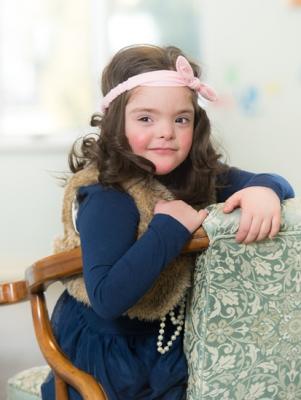
And now, after five years of therapy first through Lancaster County Early Intervention and then at Schreiber, she can do so much more.
“She came (to Schreiber) being not being able to say two words together,” Andrea said. “Now, she’s able to say, ‘I want this,’ or ‘I need that.’ She can say sentences. That’s huge.”
Andrea knows more than most what a difference Schreiber can make in a child’s life. She saw it with her sisters. She’s seeing it now with her son and daughter. For many families, this is one of the few places, maybe even the last place, where they can have hope. Hope that a son will live a full life free of anxiety, or a daughter will learn to talk.
“Families with children with disabilities, they hang onto (Schreiber),” she said. “People from the outside need to see what happens here. They need to see how remarkable this place is and the incredible things that come out of here.”
One woman’s personal connection to Edna Schreiber
May 31, 2018Barbara Willders Tomlinson heard recently there was a photo of her as a girl on the wall at Schreiber, and she stopped by the center recently to see it.
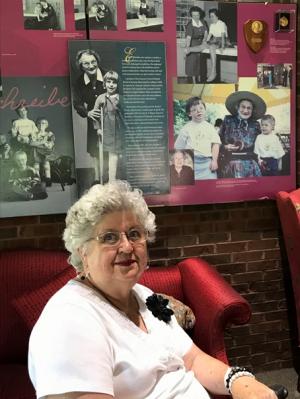
“There I am,” she said, pointing up at a photos that’s part of the large Edna Schreiber piece that hangs in our main waiting area.
Barbara Willders is 82 now. She grew up in Lancaster and was slated to go to the George Washington School for seventh grade in 1949.
Then polio interrupted. She was 13 years old.
That year, 1949, was six years before the polio vaccine, and Barbara was one of 947 cases of the disease in Pennsylvania out of more than 42,000 cases nationwide, the second highest number on record, according to archival statistics from the Centers for Disease Control and Prevention.
Barbara said she spent two weeks in the hospital and recuperated at home for most of the summer. She was able to attend school when students headed back in September.
“I was not paralyzed, but I walked funny afterward,” she said. “They used to let me go down the stairs first, by myself. And I had to wear these ugly brown shoes with big straps for about a year.”
She worked with Edna Schreiber weekly, using the Sister Kenny hot blankets that Edna had incorporated into her therapy work to restore muscle tone and movement.
“I would be wrapped up from my neck down to my feet,” Barbara said.
Her therapy continued through her time in seventh grade. She said Edna would pick her up at school, and they would go to what was then known as the Society for Crippled Children and Adults, where Edna worked.
“She was very kind and sweet,” Barbara said. “She would lay me down and have me do things, see how my legs were working.”
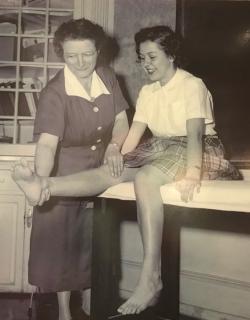
That’s pretty much what’s happening in the photo: Barbara is sitting on a table, and Edna is helping her straighten her right leg. Barbara is wearing a plaid skirt and a white blouse.
“That’s probably what I wore to school that day,” she said.
I helped her into a chair to pose for a picture. She uses a walker, but it’s not because of any lingering effects of the polio. An inner ear problem has left her with occasional dizziness and difficulties with balance.
She looked up at the photo again. She said she worked with Edna for about a year, and by eighth grade, she was mostly OK.
“I was one of the lucky ones,” she said.
Seventy years later, she was able to see how the work of Edna Schreiber continues. And she was able to see her own place in that history.
Jason Hines found his voice at Schreiber
February 8, 2018Working the checkout line at Stauffers of Kissel Hill in Lititz, Jason Hines keeps up a steady stream of chatter with every customer who comes through his line.
For some, he takes the numbers from their bill and references a date in history (he’s a history buff).
“You learn a lot of history here,” one woman told him.
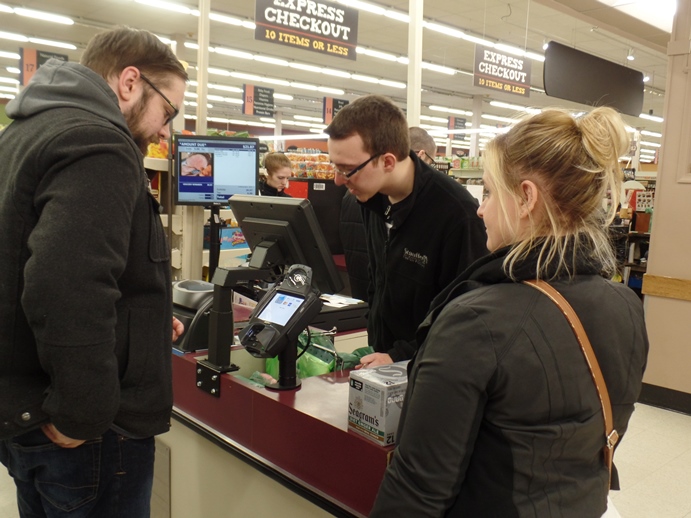
For others, he’ll share something about himself.
“This is the third anniversary of my becoming a standup comic,” he told another woman.
For every customer, he found some way to add a little extra bit of service.
“You saved 299 pennies today,” he said to one couple. “Have a great day.”
He’s 18 years old, a high school graduate working and taking classes at the Lancaster campus of Harrisburg Area Community College.
The Jason the folks at Stauffers know now is a long way from the Jason who came to Schreiber at age 3. Even before starting at Schreiber, Jason had been diagnosed with autism and was receiving Early Intervention services. Jason’s specific diagnosis, said his mom Jackie, was PDD-NOS: Pervasive developmental disorder not otherwise specified.
“I had some problems talking and had some motor delays,” Jason said.
Jackie is a special instructor at Schreiber. She knows her way around education and kids with autism and other learning disabilities. Even for her, choices could be hard. When Jason was 5 and it was time to decide whether or not to start school, Jackie was torn.
“I struggled whether to keep him in early intervention or have him start kindergarten,” she said. “Cognitively, he was ready. But his expressive language with that of a 2 year old. Ultimately we decided to send him to kindergarten, and we had plenty of support services in place.”
Initially at Schreiber, he received all threee services and special instruction from Jay Graver in the S.T.A.R.S. Preschool. Eventually, he concentrated on occupational therapy, attending Schreiber until he was 8 to work on his sensory integration, fine motor skills and attention and focus.
By middle school, he had made a lot of progress, but he still worried that he wasn’t always speaking correctly.
“Once ninth grade hit, kids stopped being jerks, and I started making more friends,” Jason said.
In high school, he flourished. He was involved in an anti-bullying program, he did plays, he sang in the choir. He joined the Unite Club, Warwick High School’s Mini-THON in support of the Four Diamonds Fund.
“I raised the most money, which made me King of Mini-THON,” Jason said.
All of his success helped him become senior class vice president and gain enough confidence to start trying to become a performer. He has dabbled in stand up comedy, telling jokes and doing impressions. He made news this month when Lancaster Online noticed that his witty patter with customers included an impression of Philadelphia Eagles play-by-play announcer Merrill Reese.
That’s how he is every day on the job at Stauffers, always a willing performer, especially for little kids. He will talk like Mickey Mouse or do voices from “Monsters Inc.” or “Frozen.” He will ask them about their favorite characters. Kids will ask moms to go to Jason’s line when they check out.
Toni Lutz, a shift supervisor for the cashiers at the Lititz store, said she knew Jason before he even started working at Stauffers. He and her daughter Madeline went to school together at Warwick.
“He’s naturally that way,” Toni said. “He’s nicer than most people. He’s just kind. It’s refreshing.”
“We Delight Shoppers” is a lyric in the Stauffers jingle, and Jason said he sang that at the end of his job interview back in 2015.
“It helped me get the job,” he said. “My charm wins people over.”
At HACC, he’s taking classes with an eye on becoming a teacher, probably an elementary school teacher. Which means he would be working with little ones on their writing and speaking and making sure they were paying attention.
And that feels just about right.
Coming to Schreiber: Essential advice on essential oils
January 11, 2018Ninette Jackson first sought out essential oils to help her dad, who suffered from Lou Gehrig’s disease. A decade and lot of education later, she has become an essential oil guru. And she’s right here in Lancaster County.
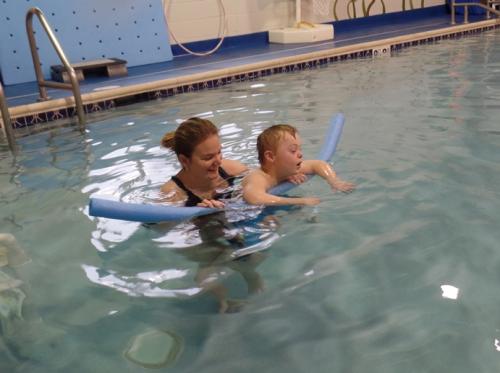
Ninette’s a lawyer by trade. But she didn’t enjoy it much. Her interest in essential oils gradually seeped into her life. The more she saw their benefits, the more she wanted to learn.
She became a distributor but saw a lot of her customers struggle with the cost. The law practice soon ended, and in 2010 Josiah’s Oils was born.
“Once I had kids, I became more interested in getting these for lower prices,” Ninette said. “I found ways to source them directly from the farms that make them. So I started a company to bring the oils in, bottle them and sell them.”
Over the years, Ninette has put in about 860 hours of study to become a certified clinical aromatherapist. Her husband Marc is an aromatherapist, meaning he hasn’t studied as much, and he manages their store on Meadow Lane in Manheim Township.
The Jacksons have five children, ranging in age from 15 to 7. In the middle is Josiah, who will be 10 in April. Josiah has Down Syndrome and visits Schreiber Fridays for physical therapy in the pool and occupational therapy.
“We’ve really enjoyed (therapy),” Ninette said. “It’s a nice way for him to get the expertise of the therapists, and it’s a great way to learn how to carry over what he does in therapy at home.”‘
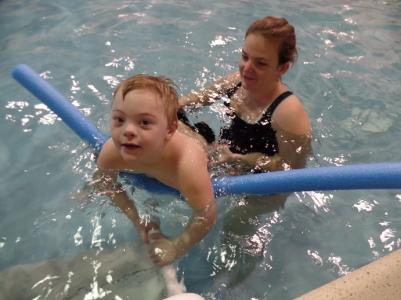
Bernie Hershey is a Schreiber occupational therapist who encourages parents to use essential oils when it’s appropriate.
“A little girl who comes for all the therapies and preschool has a diagnosis that includes difficulty paying attention to any task and anxiety,” Bernie said. “Her mother and father use essential oils in a special mixture just for her to improve her attention and allow her to attempt the skills we are working on (to improve her fine motor skills).”
Josiah has had several surgeries, and Ninette has used diffused oils to help with his post-surgery recovery.
“The doctors at (Children’s Hospital of Philadelphia) saw he needed less morphine,” she said. “Diffusing essential oils really reduces the body’s pain response.”
She doesn’t claim her products can replace traditional medicine, and she has worked in partnership with Josiah’s doctors.
“We believe in medicine; we believe in antibiotics,” she said. “I see this as a complement to what doctors are already doing. We’ll consult with pharmacists. We tell families to talk to their pediatrician. Maybe these oils can help you take one less pill to manage pain or anxiety.”
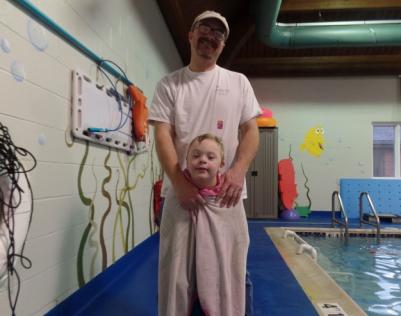
She said her customers are diverse. Many are elderly, looking to manage pain or improve sleep or help with a relative with dementia. More than 50 percent are moms looking for help for their kids, especially kids with special needs.
“We saw early on the benefits of oils, especially with Josiah,” Marc said. “We saw it making a difference in our lives.”
The Jacksons want to make a difference in the lives of Schreiber families. They will offer a free workshop here on Wednesday, Feb. 21. The event will run from 6:30 to 8 p.m.
She will talk about what not to do, how to use them safely on the skin and mention a few options for some of the common parental challenges.
“Which oils are good for what,” she said. “My child has trouble focusing: What shoud I use?”
Parents looking for help for their child with autism or ADHD or sensory issues might want to come and hear what Lancaster’s essential oils guru has to say.
